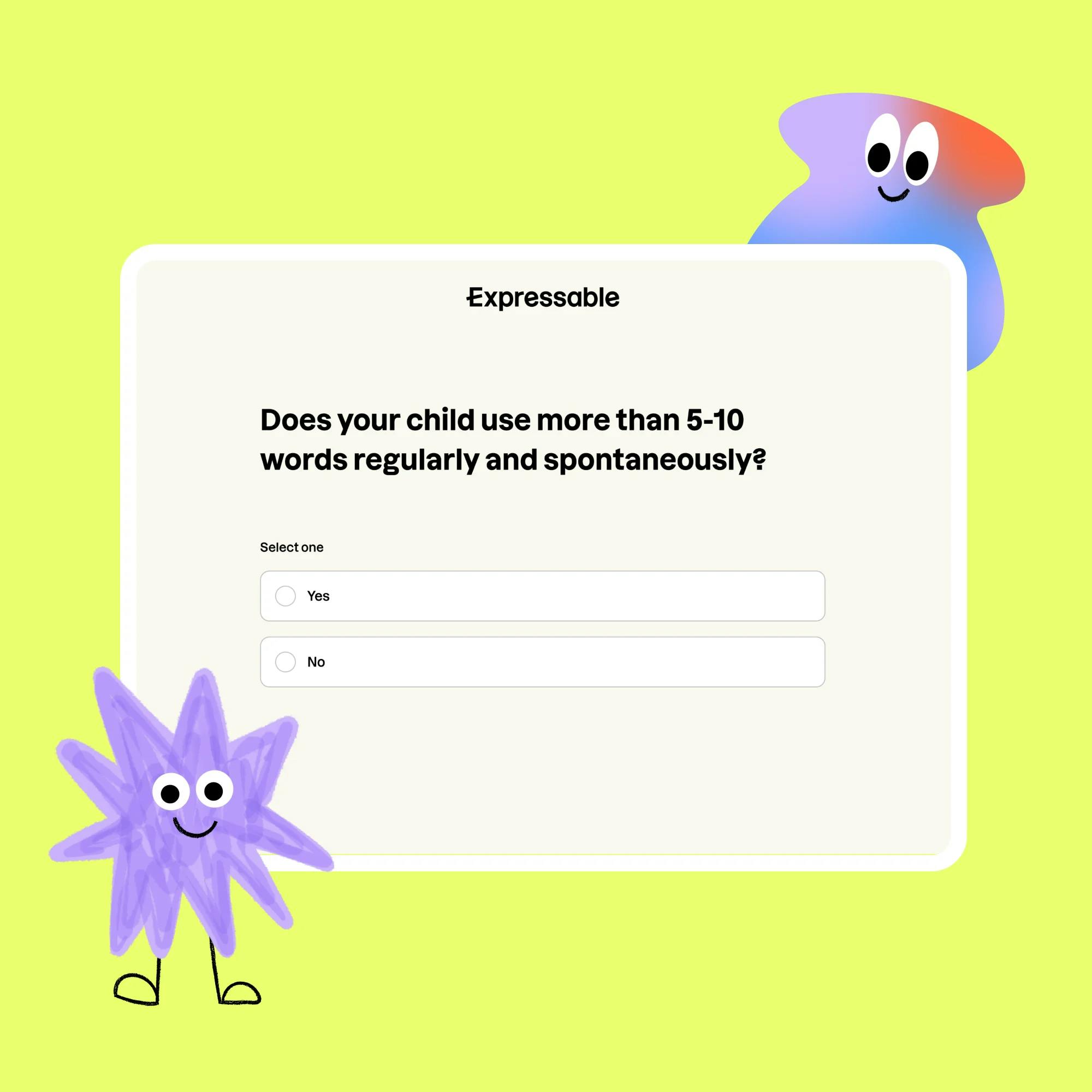Many toddlers and young children will have difficulty speaking clearly at some point. If your child has a hard time pronouncing words correctly, you may be wondering why. Could they have a speech sound disorder?
Read on to learn what’s considered typical, when speech therapy might be needed, and simple ways to help your child with their speech at home.


When should children be able to pronounce speech sounds?
As young children learn to talk, they may struggle to pronounce certain sounds correctly. This is a part of typical development. After all, speech skills naturally develop over time, and speech errors are often part of the learning process. To produce a speech sound correctly, we have to understand how it should sound. We also need to coordinate our jaw, tongue, and lips with our breathing and vocalizing.
Some sounds come easily to most kids, like /p/, /m/, and /w/. Others are more difficult, such as /z/, “sh,” and “TH.”
Here is a list of speech sounds and when children should be able to pronounce them:
Age 2 years old: /b/, /n/, /m/, /p/, /h/, /w/, /d/
Age 3 years old: /g/, /k/, /f/, /t/, “ng,” “y”
Age 4 years old: /v/, /s/, /l/, /z/, “sh,” “ch,” “j”
Age 5 years old: /r/, “dz,” voiced “TH” (as in “that”), voiceless “TH” (as in “thin”)
By age 5, most children should be able to pronounce almost all types of speech sounds.
What is a speech sound disorder?
When a child has a hard time saying sounds or words correctly past a certain age, this can be a sign of a speech sound disorder. It's often difficult to understand a child with a speech sound disorder. That can affect their experience at school and socially with their peers. As a parent or caregiver, it can be stressful to watch your child struggle to clearly communicate their thoughts and ideas.
So what is a speech sound disorder? Broadly speaking, there are two types of speech sound disorders: functional and organic.
1 Functional speech sound disorders
Functional speech sound disorders can be broken down into articulation disorders and phonological disorders. Let's take a look at each of these disorders.
Articulation disorders: Producing a sound involves coordinated movements of the lips, tongue, teeth, palate (top of the mouth), and respiratory system (lungs). Children with articulation disorders have a tough time using these motor functions to physically produce the correct speech sounds. The result is the inability to form intelligible (clearly understood) words past a certain age. Sounds may be distorted or swapped for another sound.
Phonological disorders: With a phonological disorder, a child has a regular pattern of speech sound errors. They may be able to produce individual sounds correctly, but they have difficulty putting these sounds together to form words. For example, they may be able to make the /d/ sound, but they replace it with the /g/ sound in certain words. So they say the word “go” as “doe.”
2 Organic speech sound disorders
Often, the cause of a speech sound disorder isn't known. The exception is organic speech sound disorders, which do tend to have a known cause. These fall into several categories:
Motor/neurological: Motor speech disorders occur when muscle coordination or strength is impacted. Motor speech disorders can be developmental or acquired after neurological damage, such as a stroke or traumatic brain injury.
Structural: Differences in oral and facial structures can impact speech sound production, such as for children with cleft lip and palate. These structural differences can also be caused by trauma or surgery.
Sensory/perceptual: Hearing impairment can cause speech sound difficulties, as children aren’t able to hear sounds the way others produce them. Depending on the severity of the hearing loss, the impact on speech may vary.


How to know if your child needs speech therapy
Think about the list of ages and speech sounds above. If your child is not producing the sounds expected for their age group, this is a sure sign that a speech evaluation is needed.
If your child becomes frustrated when talking with others, or people have a hard time understanding them, this is another sign they should be seen by a speech therapist. You can ask your child’s pediatrician for a recommendation. Or you can find a speech therapist and schedule an evaluation directly. Your health insurance may also have a list of in-network speech therapists to consider.
Why is it important for kids to speak clearly?
There are many reasons it’s important for kids to be able to communicate clearly. Communicating allows children to form connections and relationships with others. It also allows them to express their thoughts and ideas. And of course, communication is important for safety. If a child becomes separated from their parent or caregiver, something scary happens at school, or any kind of emergency occurs, they should be able to communicate about it with others. This includes unfamiliar listeners, or people who don’t hear them speak every day.


Let’s take a look at some other reasons clear speech is so important:
Making friends is an area to consider. Friendships form through communication. If someone’s speech is hard to understand, or they shy away from talking, this can hinder relationships with others.
Reading skills can also be affected by how a person talks. If your child has a phonological disorder, it can make reading and literacy-related schoolwork challenging.
As kids grow into adults, there will be many situations in which they have to speak in front of others. It could be a presentation at school, a college or job interview, or talking to customers or coworkers on the job. Poor articulation can make it harder to communicate your messages clearly and successfully.
If you’re concerned about your child’s speech, trust your gut. Make an appointment for an evaluation with a speech therapist.
Dacarri's story
Follow along on the journey of a preteen boy working on articulation for clearer speech. "Now I have more confidence in how I sound."
 Read Dacarri's story
Read Dacarri's storyHow to help your child with speech at home
If your child is in speech therapy, talk to their speech therapist about what they should be working on at home.
If you don’t yet have a speech therapist, you can try these general tips to help your child speak more clearly. However, keep in mind that depending on your child’s speech sound issues, these may not be the best techniques for them. It’s always recommended to have a speech therapist guiding your speech practice at home.
Slow down. Have your child slow down when they talk. See if this improves the clarity of what they’re saying.
Use shorter sentences. You can also have your child say shorter phrases and sentences. This may make their speech a little easier to understand, since there are fewer sounds and words to coordinate in shorter phrases.
Practice the easiest sounds. If your child has a few sounds they struggle with, have them repeat those sounds after you. See which ones are easiest for them, and then focus on practicing those sounds. You can start by modeling, or saying, the sounds for your child and having them imitate you. Practicing the easiest sounds first is likely to have the quickest impact on their speech intelligibility.
Work on self-correction. Help your child understand when they’ve said a sound incorrectly. If you hear them make an error, you could say, “Oh, I heard an incorrect sound. Do you know which one it was?” See if they can tell you.
Practice often. Changing a speech pattern takes a lot of consistent practice. Your child knows how to produce the sound one way, and they have to change that and learn the correct motor pattern. The more they practice, the faster they’ll make progress.
How Expressable Can Help
Concerned your child isn't reaching age-expected milestones? Looking for communication support from a professional? Expressable is a national online speech therapy practice serving children and adults. We treat all major areas of communication and feeding, offer flexible hours including evenings and weekends, and accept most major health insurance plans. We’re proud to have earned more than 3,000 5-star reviews from our clients (4.9/5 average).
Our therapy model is centered on parent and caregiver involvement. Research proves that empowering caregivers to participate in their loved one’s therapy leads to better outcomes. That’s why we combine live, 1-on-1 speech therapy with personalized education and home practice activities for faster progress.
Communication is more than words. It’s how we share how we feel and show who we are. We’re here to help you or your child do just that.

 Abby Barnes, M.S., CCC-SLP
Abby Barnes, M.S., CCC-SLP












